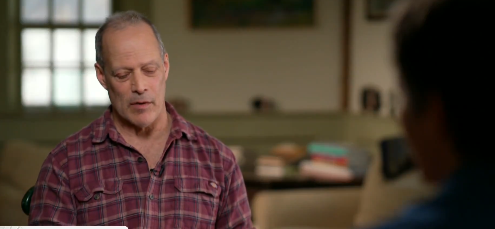Author and war correspondent Sebastian Junger covered the war in Afghanistan for more than a decade, but his biggest danger came when he collapsed outside his home. Jeff Glor met with Sebastian Junger to discuss his new book “In My Time of Dying.” See clip below
Author and war correspondent Sebastian Junger covered the war in Afghanistan for more than a decade, but his biggest danger came when he collapsed outside his home. @JeffGlor met with @sebastianjunger to discuss his new book “In My Time of Dying.” pic.twitter.com/rDr245CqBv
— CBS Saturday Morning (@cbssaturday) May 25, 2024
Sebastian Junger, a 62-year-old American journalist and author known for “The Perfect Storm,” faced a near-death experience that profoundly impacted his life. This ordeal is detailed in his new book, “In My Time of Dying: How I Came Face to Face with the Idea of an Afterlife.” Junger’s experience began during a serene moment with his wife at their remote Cape Cod cabin in Massachusetts in the summer of 2020. Suddenly, he was struck by excruciating pain due to a rupture from an undiagnosed aneurysm in his pancreatic artery, causing him to bleed internally.
.@sebastianjunger recounts the near-death experience that inspired his book, "In My Time of Dying" pic.twitter.com/wiDMONX23G
— The Daily Show (@TheDailyShow) May 23, 2024
As he was losing a pint of blood every 10 to 15 minutes, Junger was rapidly approaching death. His condition was critical by the time he reached the hospital, where doctors struggled to stabilize him. During this crisis, he experienced a surreal moment where he perceived his late father above him and a deep, dark pit below. He described the pit as “the purest black and so infinitely deep that it had no real depth at all,” which he felt an unanswerable pull towards, a sensation he recounted with dread.
Adding to this vision, Junger saw his father, who had passed away eight years earlier at the age of 89. His father’s presence, which might have been comforting to some, instead filled him with terror. His father seemed to invite him to join him, an offer Junger found grotesque given his desperate desire to cling to life. He recalled telling the doctor urgently, “You’ve got to hurry. You’re losing me. I’m going right now,” before losing consciousness.
“Because death is the ultimate consequence, it’s the ultimate reality that gives us meaning.” Sound on to hear an excerpt from the audiobook edition of IN MY TIME OF DYING, read by yours truly and available now from @SimonAudio: https://t.co/kxZrEWUvfa pic.twitter.com/KwzgmeS7L9
— Sebastian Junger (@sebastianjunger) May 23, 2024
This brush with death left Junger to contemplate mortality in ways he had never expected. Upon awakening in the ICU, a nurse informed him of the severity of his condition the previous night, leading him to reflect on death not as an abstract concept but as a stark reality. This event, he said, was not the adrenaline-fueled brush with death he had previously known but something far more profound and terrifying.
Following his recovery, Junger found himself questioning his memories of the event. His wife, Barbara, confirmed that his recounting of the near-death experience was one of the first things he spoke of upon her visit to the hospital. This confirmation helped him realize the magnitude of what he had experienced.
Junger’s life has been marked by several near-death encounters. Apart from his medical emergency, he had previously almost drowned while surfing and narrowly escaped death in Afghanistan when his Humvee was blown up. These incidents, along with the death of his friend and colleague, photographer Tim Hetherington, during the Libyan Civil War, compounded his sense of having been perpetually close to death.
The award-winning war reporter and bestselling author of #Tribe and #ThePerfectStorm @sebastianjunger shares his near death experience and the profound existential reckoning that followed.
Wed, 5 June | 7:00pm | London
Tickets: https://t.co/5kGhje6vxm pic.twitter.com/Kopf8h4AGR— How To Academy (@howtoacademy) May 21, 2024
These experiences left Junger profoundly changed, confronting him with a sense of mortality and vulnerability that he struggled to manage. The psychological aftermath was intense, leading him to seek therapy to address his anxiety and depression, symptoms he recognized from combat trauma but exacerbated by his medical crisis.
Junger’s reflections in his book extend beyond his personal experiences to a broader contemplation of life, death, and the human condition. Raised to be skeptical of organized religion, Junger had navigated life without deep spiritual beliefs. However, his experiences forced him to confront the fragility of existence and the randomness of survival.
Ultimately, Junger’s journey through near-death experiences, recovery, and reflection aims to provide solace and understanding to others facing their mortality or struggling with the aftermath of similar traumatic experiences. He hopes his insights can offer comfort and guidance to those grappling with the existential challenges of modern life.
Major Points
- Near-Death Experience: Sebastian Junger, author of “The Perfect Storm,” suffered a life-threatening aneurysm at a remote cabin, leading to a profound near-death experience where he envisioned a dark pit and saw his deceased father.
- Hospital Ordeal: During emergency treatment, Junger lost consciousness multiple times and was moments away from death, as recounted in his book “In My Time of Dying.”
- Psychological Impact: Following his recovery, Junger struggled with deep psychological effects, questioning his memories and experiencing severe anxiety and depression, similar to combat trauma.
- Life Reflections: Junger’s multiple brushes with death, including his medical emergency and previous life-threatening incidents, prompted him to reflect on life, death, and his skepticism of organized religion.
- Literary Contribution: In his latest book, Junger explores these themes, aiming to offer comfort and insight to others who may be grappling with their mortality or the aftermath of traumatic experiences.
Al Santana – Reprinted with permission of Whatfinger News



